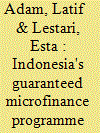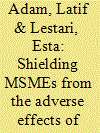|
|
|
Sort Order |
|
|
|
Items / Page
|
|
|
|
|
|
|
| Srl | Item |
| 1 |
ID:
114006


|
|
|
| 2 |
ID:
154535


|
|
|
|
|
| Summary/Abstract |
This paper analyses the first stage of the Kredit Usaha Rakyat (KUR) programme, the guaranteed microcredit programme for supporting the development of SMEs in Indonesia. KUR is a partial credit guarantee programme that helps to fulfil the collateral requirement hindering SMEs from accessing credit. By gaining access to credit, SMEs are expected to develop while also creating employment and generating income for the poor and near poor. Based on KUR's loan disbursement, its number of participating banks, and its number of borrowers, this paper shows that the implementation of the programme attracted millions of SMEs. This paper then highlights the ways in which KUR has or has not addressed market failures in the credit market for SMEs. This paper also shows that KUR's role in accelerating poverty reduction is still questionable as there are many poor households unable to access the programme. Hence, the main policy challenges are: first, improving the design of KUR to reduce information asymmetry; second, ensuring that KUR meets its anti-poverty objectives by reaching the right sectors and the right regions; and third, strengthening the KUR Policy Committee's oversight and ability to coordinate across key stakeholders.
|
|
|
|
|
|
|
|
|
|
|
|
|
|
|
|
| 3 |
ID:
180545


|
|
|
|
|
| Summary/Abstract |
This paper examines the Indonesian government's new microcredit programme, the Ultra Microcredit (UMi) scheme, designed to provide cheap, hassle-free loans to micro businesses (MBs) owned by the poor and vulnerable. Based on UMi's loan disbursement, the number of participating non-bank financial institutions (NBFIs), the number of borrowers and its impact on the borrowers' business performance, this paper shows that the programme has so far been significantly promising in supporting the development of MBs. This study not only highlights the ways in which UMi has addressed various problems that MBs face, but also details the scheme's limitations in achieving its large-scale anti-poverty objectives. The results show that UMi's main policy challenges can be overcome by: first, shifting its distribution away from Jakarta and towards the less prosperous provinces of the country; second, improving business facilitation services; and third, complementing the scheme with other non-financial programmes.
|
|
|
|
|
|
|
|
|
|
|
|
|
|
|
|
| 4 |
ID:
192855


|
|
|
|
|
| Summary/Abstract |
This paper examines the Indonesian government's policy response under the PEN (National Economic Recovery) programme aimed at assisting MSMEs during the COVID-19 crisis. The findings show that the scheme significantly benefited the enterprises. Credit restructuring and interest subsidy programmes offered critical assistance to the beneficiaries and improved their access to credit options. Moreover, the Productive Government Assistance for Micro Businesses (BPUM) initiative enabled the beneficiary enterprises to address emergency working capital needs required during the pandemic. However, this study also identifies several hurdles that reduced the effectiveness of the PEN programme. These challenges could have been overcome by striking a balance between banked and unbanked MSMEs, maintaining reliable databases for targeted recipients, and strengthening coordination between the various agencies involved.
|
|
|
|
|
|
|
|
|
|
|
|
|
|
|
|
|
|
|
|
|